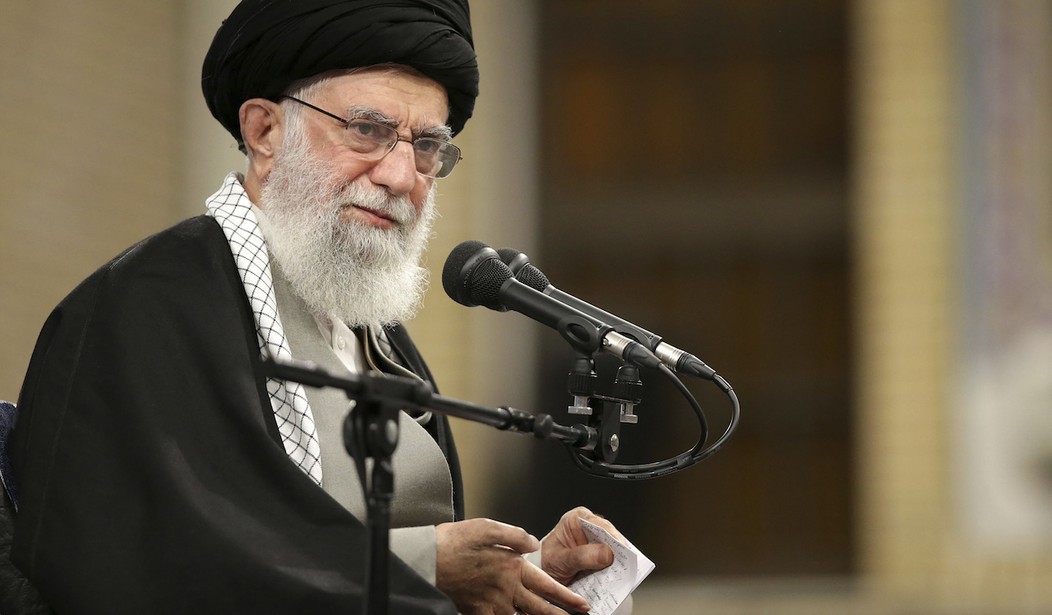If you're just joining this controversy, feel free to go back and read our previous posts about it. This isn't some minor partisan squabble; it's a serious affront to the national security of the United States and her allies. It's so egregious, in fact, that three members of President Biden's own negotiating team have walked away in protest. The scope of the would-be giveaway is that vast and indefensible. And in an election year, with Democrats' collective fate heavily tied to the president's popularity, even some congressional Democrats are sounding the alarm:
A bipartisan group of House lawmakers warned President Biden Thursday they were unlikely to support a possible return to the Iran nuclear agreement as Tehran made new demands of the US. The 21 members, led by Reps. Josh Gottheimer (D-NJ), Elaine Luria (D-VA), and Tom Reed (R-NY), said in a letter to the president that they were “highly concerned” about reports the White House is mulling the removal of anti-terror sanctions targeting the Iranian Revolutionary Guard Corps. In all, 12 Democrats and nine Republicans signed the letter. “We will review any agreement closely, but from what we currently understand, it is hard to envision supporting an agreement along the lines being publicly discussed,” they wrote, noting that Secretary of State Antony Blinken had told Congress he would keep the terrorism sanctions in place. “As the State Department has often noted in reference to a nuclear agreement with Iran, ‘Nothing is agreed until everything is agreed.’ We hope that no agreement is finalized without additionally addressing these concerns,” the lawmakers added.
A deep concern that longtime federal prosecutor and terrorism expert Andy McCarthy has explained in detail is that the Biden administration is claiming the would-be accord is simply a continuation of the previous Obama-era deal and is therefore not subject to new congressional review. But as McCarthy also explicates, the potential agreement is undeniably new – and is, indeed, worse than the already-weak Obama agreement. A bipartisan demand for a vote could pressure the administration into agreeing to a vote on Capitol Hill, but that's not guaranteed.
The way this issue has been discussed in recent days would suggest that the whole thing is a done deal. The lead Russian negotiator – again, talking to the Iranians on America's behalf, thanks to the Biden team – sounded very pleased about how well the Iranians had fared under the terms, going out of his way to praise the Chinese for their help during the process. But it would seem as though there may be a snag in the sprint toward this shocking capitulation, and it may be due to Russia's desperate, self-inflicted, and self-interested situation:
Recommended
This is key: "So after 11 months of intermittent negotiations in Vienna, **talks will likely take a pause to allow for bilateral conversations between #Iran and #Russia over the situation.**" 2/2
— Jason Brodsky (@JasonMBrodsky) March 10, 2022
The Iran nuclear talks are on the precipice of collapse over last-minute Russian demands for sanctions protection, according to two diplomats. Negotiations have reached an impasse over the Russian requests, diplomats said, imperiling the revival of a 2015 landmark deal under which Iran limited its nuclear ambitions in exchange for sanctions relief. Russia is requesting that any return to the agreement include guarantees that any future Russian business with Iran be exempt from EU and U.S. sanctions — a late curveball from Moscow in response to the crippling penalties the country is facing over its invasion of Ukraine...But negotiators from the other world powers involved...can’t find a way to accommodate the demands, diplomats said. So after 11 months of intermittent negotiations in Vienna, talks will likely take a pause to allow for bilateral conversations between Iran and Russia over the situation. Iran seems eager to close the deal, given the potential revenue it can gain from exporting its oil with prices now soaring and its need for sanctions relief.
The development is a remarkable U-turn. As recently as last week, it was widely expected that negotiators were about to unveil an agreement to return to the 2015 deal, formally known as the Joint Comprehensive Plan of Action (JCPOA), One senior Western official familiar with the situation told POLITICO the Russian demands were impossible to accommodate since the negotiation in Vienna was about bringing Iran and the U.S. back into compliance with the 2015 deal, and not about sanctions on Moscow...“The talks seem to have stalled, primarily because of Russian demands,” he said.
It would be poetic justice if the Biden administration's decision to outsource our own negotiations with an anti-American terrorism-backing regime to Moscow ultimately doomed the agreement due to...preposterous, selfish demands from Moscow. This apparent "pause" comes at an essential moment, as Republicans on Capitol Hill scramble to mobilize against the rumored accord. The worry, per at least one whistleblower, was that Biden would sign off on a stunningly bad deal and that billions would immediately start to flow to some of the world's worst actors before Congress could do anything. This reported delay – forcing Moscow and Tehran to huddle – at least buys time. Republicans must take advantage of this gift and work assiduously to build bipartisan pressure on the White House. I asked Rep. Dan Crenshaw (R-TX) about this issue and these developments:
.@DanCrenshawTX (R-TX) Sounds Off On The Pentagon Rejecting Poland’s Plan To Send Fighter Jets To Ukrainehttps://t.co/tOydAbg82z
— The Guy Benson Show (@GuyBensonShow) March 10, 2022
For a broader look at the geopolitical posture of the Biden administration, I'll leave you with this – which references this development:
Iran going nuclear; North Korea testing bigger ICBMs; Putin moving on Kiev. And the only place Biden admin is flexing muscle is stopping Ukraine from getting jets. https://t.co/xhYL1goONN
— Noah Pollak (@NoahPollak) March 11, 2022

























Join the conversation as a VIP Member